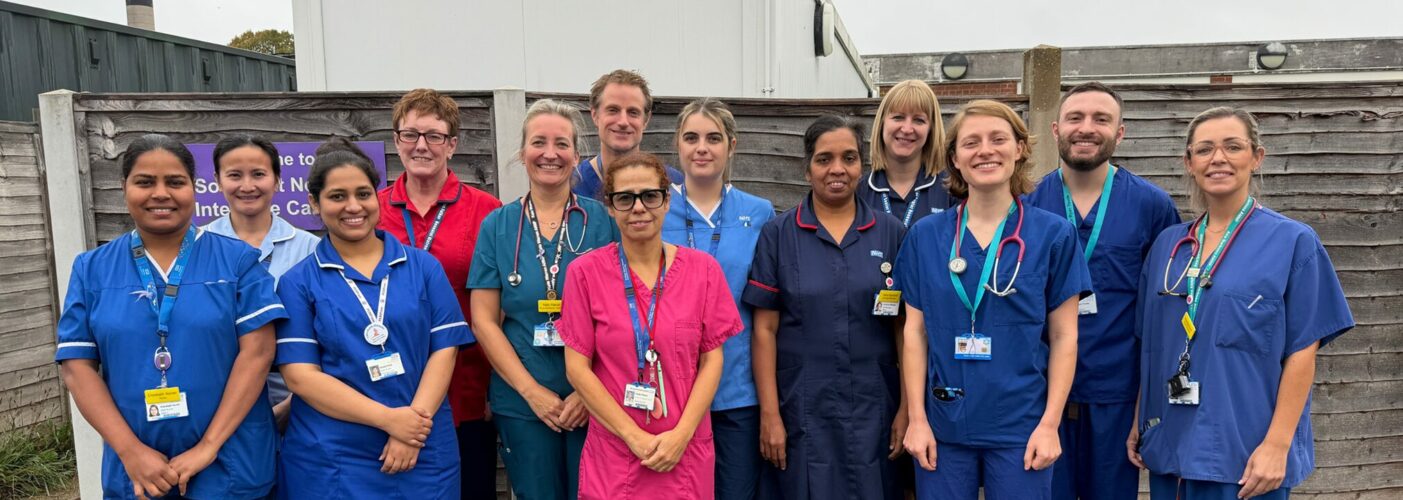
Spotlight
Musgrove Park team celebrates runners-up spot at neonatal care awards
It’s smiles all round for the team on our Somerset Neonatal Intensive Care Unit, after reaching the finals at the national Neonatal Nurses Association Awards.
The team was shortlisted for Neonatal Team of the Year 2025, for the work they've done to help parents safely return home with their babies up to five days earlier than before.
Some babies who would previously have needed to stay in hospital for up to seven days receiving antibiotics through a drip, are now able to return home after as little as 48 hours, with a course of oral antibiotics that can safely be taken at home.
Ana Barbosa, one of our advanced neonatal nurse practitioners, says: “Since we began this project in February, we identified 19 babies in the first six months who were suitable to go onto oral antibiotics at home.
“This has freed up 86 bed days over six months – which in real terms means about one neonatal hospital bed every two days.
“We followed international studies that show oral antibiotics are as effective as IV antibiotics.
“In total we ran 76 virtual consultations in five months and there were no readmissions to our emergency departments or paediatric assessment unit, which is a real marker of success – AND great news for families.”
Ana explains how the decision is made to include a baby in the project. “When babies are born with risk factors or the mum has maternal sepsis, our usual process involves using a calculator, called Kaiser, which works out the risk of infection to a baby.
"We screen the baby if the Kaiser recommends us to, or if the baby if symptomatic, and all babies screened for sepsis are put on a minimum 36 hour course of antibiotics.
“We take the baby’s blood when we first screen them, and again after 24 hours, to check their C-reactive protein (CRP) levels — a marker that helps us understand if there’s inflammation or infection. If the CRP levels are negative, blood cultures at 36 hours are negative, and the baby is clinically well, we can stop the antibiotics altogether.
“If the CRP is raised, the blood cultures come back positive, or the baby is clinically unwell, we would consider further investigations and administer a minimum of seven day course of antibiotics.
“But for these babies where the CRPs are raised (between 15 and 50), but they are clinically well, they meet the criteria to be able to complete their course of antibiotics at home, instead of having to stay in hospital for seven days.
“Those babies will have their first 36-48 hours of IV antibiotics in hospital, before completing a further five days of oral antibiotics at home.”
Ana adds that one of the main reasons the team undertook the project was to improve the bonding experience between baby and family.
“Taking a baby home for the first time is one of the most precious moments a family can ever have, and to be able to do this sooner is so great,” she says.
“Once the baby is home, our consultant will have an initial video call with the parents to visually check that the antibiotics are working well, and they’ll keep in touch daily.
“We also send them home with a thermometer, so the parents can check their baby’s temperature once a day while on a call with the consultant.
“We then bring the baby and family back into hospital on the last day of their course of antibiotics for a formal clinical review, where we repeat the bloods again to make sure that the CRP is coming down nicely, and the baby is still clinically well.
“On the day of the clinical review, we also ask parents to return any remaining medication so we can safely dispose of it — and even recycle the plastic caps.
Ana adds that everyone on the neonatal unit is so thrilled to get such recognition. “The awards shortlist acknowledges our team's incredible efforts to improve the neonatal experience for colleagues, babies, and families,” she says.
“It all came about after our neonatal team submitted a poster to the Neonatal Nurses Association’s annual conference about this work, and they were promptly invited to give a presentation to spread the word of their good work to other areas of the country.
“While preparing our presentation, I noticed the awards so I nominated our team, and to our delight we were named as finalists. It was so exciting and a real honour to be able to talk about our unit on a national stage.”

